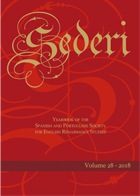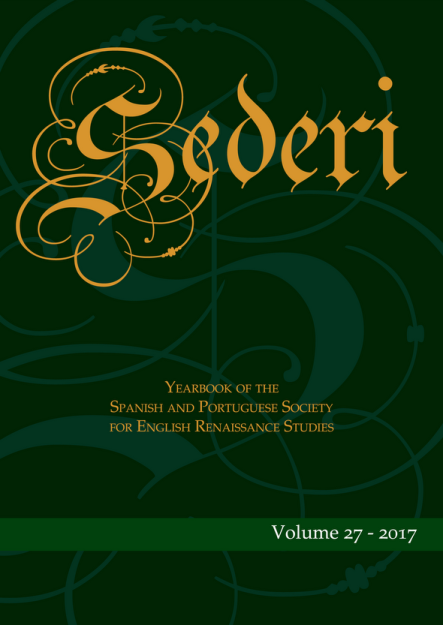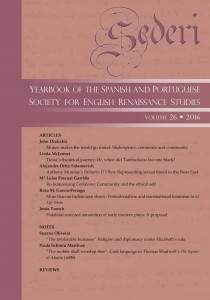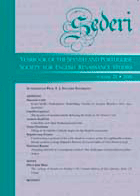Tomás Monterrey, “El príncipe tirano by Juan de la Cueva as the Spanish source of Thomas Lodge’s A Margarite of America: A comparative suggestion.” SEDERI 28 (2018): 33–53. DOI: https://doi.org/10.34136/sederi.2018.2 […]
Autor: sederi
Sederi Yearbook 28
William C. Carroll, “’I knew him in Padua’: London theatre and early modern constructions of erudition.” SEDERI 28 (2018): 7–32. DOI: https://doi.org/10.34136/sederi.2018.1 Download PDF Abstract This […]
Sederi 28

Sederi 28
Sederi 28 — 2018
EDITOR
Ana Sáez-Hidalgo
MANAGING EDITOR
Francisco J. Borge López
REVIEW EDITOR
María José Mora
ISSN 1135-7789
Sederi 27

Sederi 27
Sederi 27 — 2017
EDITOR
Ana Sáez-Hidalgo
MANAGING EDITOR
Francisco J. Borge López
REVIEW EDITOR
María José Mora
ISSN 1135-7789
About
ISSN 1135-7789 SEDERI, Yearbook of the Spanish and Portuguese Society for English Renaissance Studies, is an annual open-access publication devoted to current criticism and scholarship on English Renaissance Studies. It is peer-reviewed by external referees, following a double-blind policy. The SEDERI Yearbook is included in the following indexes and repertories: Annual Bibliography of English Language and Literature […]
Sederi 26

Sederi 26
Sederi 26 — 2016
EDITOR
Ana Sáez-Hidalgo
MANAGING EDITOR
Francisco J. Borge López
REVIEW EDITOR
María José Mora
ISSN 1135-7789
Information for Authors
- Relation to SEDERI areas of interest.
- Originality and interest of the topic in relation to current research.
- Use of concepts and methods of analysis.
- Interest of data analysed, results obtained and conclusions reached.
- Depth of discussion of issues, problems and theoretical concerns.
- Coherence and cohesion in the thread of argument and structure.
- Clarity, conciseness and command of the language.
- Knowledge and review of bibliographical references and sources.
- Engagement with and discussion of other studies on the topic.
- Title: its adequacy, clarity and informative quality.
- Early Modern English Literature
- Early Modern English History and Culture
- Early Modern English Language
- Restoration English Studies
- Early Modern Anglo-Spanish cross-cultural studies
- Early Modern Anglo-Portuguese cross-cultural studies
- Time from submission to decision: 3-4 months
- Time from decision to publication: 6-9 months
- Number of readers prior to decision: 2-3
- Articles/Notes submitted per year: 10-15
- Articles/Notes published per year: 40%
- Information last updated: September
Copyright holder: SEDERI
Only original research is published by SEDERI. Therefore, we do not consider research pieces that have been published elsewhere (either in print or online) or are under simultaneous consideration with another publisher; translations are not considered either.
Authors will be asked to sign a declaration stating that their contributions have not been previously published, in whole or in part, and do not infringe the copyright or property right of another journal, author or publisher.
Permission for publication of copyrighted material (pictures, photographs, etc.) should be obtained by the author.
The copyright holder of the published contributions is SEDERI.
The issues will be available online in the SEDERI website (www.sederi.org/yearbooks.htm), in OJS (https://recyt.fecyt.es/index.php/SEDY), in Academia.edu (https://sederi.academia.edu/SEDERISpanishPortugueseSocietyforEnglishRenaissanceStudies), in Dialnet (https://dialnet.unirioja.es/servlet/revista?codigo=7539) and other repositories that have signed an agreement with SEDERI.
Those authors who wish to republish or rewrite their contributions for another journal/book or include the published article in their personal repositories should contact the editors to obtain permission to do so. This will entail citing SEDERI as the original source and sending the editors a copy of the new version.
INFORMATION FOR READERS
SEDERI publishes scholarly research pieces, which will be available both in print and online. These will be Open Access, in the spirit of sharing knowledge. Moreover, SEDERI does not charge authors a publication fee. Remember, however, that the journal is copyrighted, and therefore any kind of usage of SEDERI material must give credit to the journal by citing the authorship and full publication details. The usage of SEDERI material for commercial purposes is not allowed without the journal’s permission.
If you have any further queries, do not hesitate to contact the editors
SEDERI, Yearbook of the Spanish and Portuguese Society for English Renaissance Studies
Marta Cerezo, EDITOR
Isabel Guerrero, MANAGING EDITOR
Miguel Ramalhete, REVIEW EDITOR
Tamara Pérez-Fernández, David J. Amelang, PRODUCTION EDITORS
SEDERI
http://www.sederi.org/yearbook/ sederiyearbook@yahoo.es
https://recyt.fecyt.es/index.php/SEDY
Sederi 25

Sederi 25
Sederi 25 — 2015
EDITORS
Berta Cano Echevarría & Ana Sáez-Hidalgo
REVIEW EDITOR
Francisco J. Borge López
ISSN 1135-7789
| NOTES | Pag. | |
|---|---|---|
| Mora, María José. The casting of Sancho in Durfey’s The Comical History of Don Quixote, Parts I-II (1694) | 155-167 |

